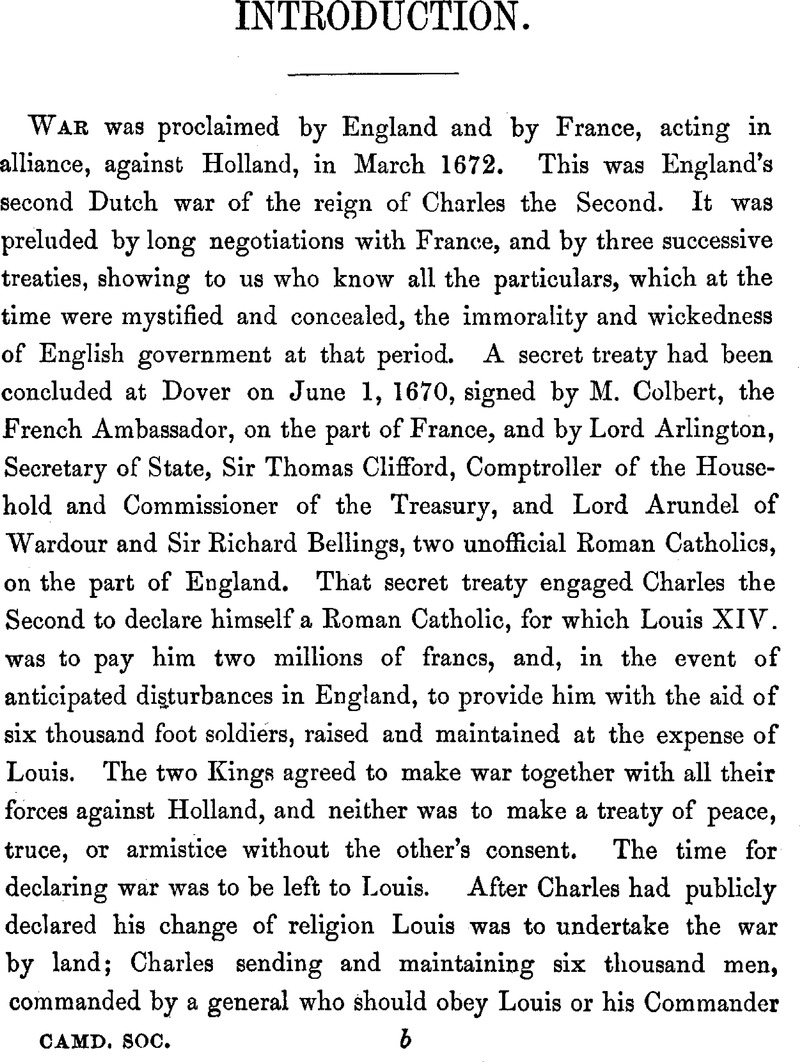No CrossRef data available.
Article contents
Introduction and Errata
Published online by Cambridge University Press: 24 December 2009
Abstract

- Type
- Introduction
- Information
- Copyright
- Copyright © Royal Historical Society 1874
References
page ii note 1 This secret treaty was first published by Dr. Lingard, in 1830, in his History of England, from the papers of Lord Clifford, one of the signataries. An account of it had been published in 1682, by the Abbé Primi, in Italian and French, at the, instigation of Louis XIV. but the Abbé's book was immediately suppressed on strong representations from the English government. The substance of Primi's statements was published in England immediately after the Revolution. Hume, who published his volumes of Charles IL's reign in 1756, made no allusion to Primi's book or the secret treaty. Bishop Burnet refers to the Abbé Primi's book (Own Time, i. 503), and so does Edmund Calamy in his Autobiography, written before 1731 (Life and Times, i. 69). Calamy, in the same passage, mentions a sermon of Archbishop King, preached in Dublin in 1691, in which he gives an account of the treaty, derived from a paper found in Lord Tyrconnel's closet. Lord Tyrconnel at the time of the treaty was Colonel Bichard Talbot, a favourite of the Duke of York.
page iii note 1 This second treaty is called traité simué in the French documents. See Dalrymple's Memoirs, and Mignet, Négotiations relatives à la Succession d'Espagne.
page vi note 1 Temple's Memoirs, from 1672 to 1679, in Works, vol. ii. p. 255, 4 vols. 8vo. 1814.
page ix note 1 All the despatches of the ambassadors addressed to Clifford, who acted as Secretary of State in Arlington's absence, are among the papers at Longleat, in possession of the Marquis of Bath; they came there probably through Halifax, who was cousin and intimate friend of Sir Thomas Thynne, afterwards Viscount Weymouth.
page xii note 1 Burnet's Own Time, i. 348.
page xii note 2 From the archives of the French Foreign Office quoted in my “Life of Shaftesbury,” vol. ii. p. 135.
page xiii note 1 Colbert wrote, November 20, 1673, to his government that St. Evremont, who had good opportunities of information, had told him that Arlington was a secret promoter of the Test Act, and that he was himself inclined to believe this. Colbert adds, “I have even reason to give some faith to what St. Evremont tells me, that Arlington has co-operated with the Chancellor for the new oath, knowing well that Lord Clifford conld not take it.” (Mignet, iv. 236. Dalrymple, ii. 90.)
page xv note 1 Evelyn's Diary, July 22, 1674.


